- Home
- Alfred Bester
GOLEM 100 Page 2
GOLEM 100 Read online
Page 2
“And how,” wondered Ind’dni, “is this to be reported to Legal? The insects and the pinions were on her. Yes?”
“Yes, sir.”
“We saw them disappear. Yes?”
“Yes, sir.”
“We have all seen identical?”
“Yes, sir.”
Ind’dni gazed around at his squad. All were obviously sincere and convinced in their reports. He sighed. “Then we have all seen and unseen the cause of this most cruel death?”
“Yes, sir.”
“Just so. Do we believe what we have seen and unseen?”
“It isn’t easy, sir.”
“Easy? No. Impossible. Impossible to report to Legal. Perhaps best would be to report ourselves to lunacy.”
Subadar Ind’dni sniffed curiously. His nostrils twitched. He was familiar with the hundreds of fetors that polluted the Guff, but this stench was new. It was unique. He was astonished again.
“Where’s Satan?”
“Not here.”
“Anybody see anything stirring in the pentacle?”
“Not a sign.”
“Anybody feel anything? How about you, Sarah? Footsies from the Devil?”
“Not even a tickle, Regina. Alas. Alas! ALAS!”
“Drat! What a letdown.”
“Maybe he wasn’t home.”
“Somebody should have been there to answer.”
“Maybe he’s unlisted.”
“That shouldn’t make any difference; it was person-to-person. Well, don’t let’s give up. We’ll try again next week. All right?”
The hysterical calls to the Guff precinct complex were just so much gibberish. But when Subadar Ind’dni arrived with his squad, he understood why and was appalled.
The man was circling a pillar stub of the decayed opera-house portico; crawling, falling, rising, stumbling, crying piteously, shrieking, calling on Christ and cursing his gods. There was a gash in his belly that oozed blood and extruded intestine. One end of his gut had been fastened to the pillar, and as he circled and circled it was torn out of him, inch by inch, to garland the column with a bloody, grey hawser. He was driven to eviscerate himself by—
“What?” Ind’dni burst out. “By what, please? What? Never have I— Never. You see? We see?”
They saw a hulking gun-metal executioner that glittered and gleamed; that had shape and yet no shape. It was amoebic, amorphic, protean-flowing as it extruded legs, feet, pads, and hands; a dozen hands, a score of hands, a multitude of hands. Some glowed hot; so white-hot that their odor mingled with the stench of the victim’s burning back as the sear of their roasting and prodding drove him around the pillar, pulling his gut out until he tore the Guff with his last screaming agony and shriveled into death. Then the hulk disappeared, leaving only its unique odor to pollute the Subadar’s nostrils.
“Yes, I know it now,” he thought. He was incapable of speech through his retching. “I recognize it. It is the bouquet de malades, the aroma of the mad.” At last he managed to speak to his aides. “You saw? We saw? All?”
They could barely nod.
“And what was that we saw?”
They shook their heads.
“It was a man? An animal? A creature? Alive?”
They shrugged helplessly.
“Had it a face? Features? I saw none.”
“Neither did we, Subadar.”
“But it had feet. Many. They came and went like the thing itself. And hands. How many hands saw you?”
“Ten, sir.”
“No, fifty, sir.”
“More than that, sir. A hundred, at least.”
“To be agreed. A hundred-hander, and some hands white-hot. You saw?”
“Yes, Subadar, but…”
“Ah. You say, ‘Yes, but…’ and then you cannot continue. Yes. But. But how can flesh glow white-hot, eh? And yet we saw. Flesh cannot glow like metal. But. We saw the hundred hands torture and kill. We saw the creature disappear, and living things cannot disappear. But it was alive and it did. But. But. But. How explain the ‘But’ to Legal? How explain to ourselves?”
“Well, we’ve failed again. Damn it, ladies, it’s not working.”
“Maybe that’s our trouble, Regina. We’re not damned… enough.”
“Are we sure we got the chants right?”
“Letter-perfect.”
“Maybe they’re the wrong spells.”
“I got them out of my wicked books, word for word.”
“What about that Hand of Glory I’ve been holding? Genuine? Was the candle made from the fat of a virgin?”
“My Droney’s word for it, Yenta. And the hand that holds it is truly the hand of an executed felon. My Droney has heavy clout at the morgue.”
“How does he do it, Nell?”
“Bribes, Sarah.”
“B*R*I*B*E*S? For what?”
“I thought everybody knew. My Droney’s a dedicated necrophiliac, bless him.”
“Ladies, no more chitchat, please. I think that’s the real problem; we’re not serious enough. We’ll have to try again, and this time make it sincere.”
They were stretched out in a neat row, ten of them lying supine in the rusting, rotting car dump; boy-girl-boy-girl, almost like a love-gig except that they weren’t swinging on each other. They were dead.
“Most recent Lethal,” Subadar Ind’dni observed, fighting for composure. “They still bleed, you perceive?” He sniffed and his delicate features twisted in disgust. He recognized the sinister bouquet de malades. “Yes. It is to be sure. Our Hundred-Hander again. Only such a monstrous thing could have contrived this.”
The contrivance was simple and brutal. The genitals had been torn off each boy, living and conscious as the frozen contortions of the faces revealed, and thrust into the mouth of a girl. A breast had been torn off each girl and thrust into the mouth of a boy. Subadar Ind’dni took a deep breath and shook his head.
“To confess an admission,” he told his staff, “I think I have lived in the Guff too long. When first I came to the Corridor, it was so much like my dearly remembered Bombay. I was so happy and at home. But there has been change and change and change. You agree, gentlemen?”
“Yes, sir. The Corridor has changed in our time.”
“To be sure there must always be change and we must always, as civilizèds, adapt; but adapt to what? This? And the other Lethals of the Hundred-Hander? What is this hundred-handed monster that stinks of madness? Whose Lethals stink of madness? Is it of animal? Yes and no. Is it of vegetable? Yes and no. Is it of mineral? Yes and no. Is it of anything we have ever encountered before?”
“The answer is no, Subadar.”
“To be sure. Is it motivated by any purpose we have ever discovered before?”
“No, Subadar.”
“Is there anything on earth like this thing of hands and stench and madness and cruelty?”
“No, sir.”
“Could it be alien from outer space, as in entertainment drama?”
“No, Subadar. Our communications section knows there’s no life of any sort within light-years of our system.”
“They know, or believe?”
“They know, sir. The five-hundred-meter radio telescope has been beaming out to the entire galaxy for two centuries… a human figure, binary numbers, atomic numbers, DNA structure, a diagram of our solar system… and no response. We’re alone in our segment of the Milky Way galaxy.”
“Most interesting. Then it is not alien from our galaxy, so it is alien of our own solar. It is living and impossible. It is incomprehensible fact. Inconceivable. Unknowable. Inexplicable. Yet it is fact. It is a new Guff madness.”
“Yes, Subadar.”
“Is it then required of us to master this new madness?”
“We must, sir. We’re required by our duty.”
“Ah yes. Our moral and legal obligation, but how to deal with this? Do we respond to each new madness of the Guff by going newly mad ourselves? Must we perform this adaptment to
meet our responsibilities, to conform and be thought normally sane in a world that is of a raving madness?”
“We have to conform, Subadar… all of us.”
“Then must we cling to our civilized values in secret and become Closet Sanes? What shall happen to us? What is happening to the Guff and the Corridor? I beg of you, gentlemen, tell me if you can… What is the Northeast Corridor today?”
3
By now, of course, the Northeast Corridor was the Northeast slum, stretching from Canada to the Carolinas and as far west as Pittsburgh. It was a lunacy of violence inhabited by a swarming population with no visible means of support and no fixed residence. It was so vast and chaotic that demographers and the social services had given up all hope. Only the police continued the struggle.
It was a monstrous raree show that everybody denounced and adored. Living in the Corridor, and particularly in the Guff of the Corridor, was like being desperately in lust with a freaked-out Hottentot Venus. You hated it but you couldn’t kick it.
Even the privileged class, like Queen Regina and her seven bee-ladies, who could afford to live protected lives in luxury Oases and, indeed, could escape to anywhere they damn pleased, never dreamed of leaving the Guff. The jungle magicked you. It was alive, by God! Its dementia churned up exciting new vices, sins, crimes, outrages. You never knew when you might be suddenly dead, but you always knew you were superbly alive.
There were hundreds of daily survival crises in the Corridor. Cold was a major discomfort. Everybody was chilled and winter seemed to be stretching out into half the year. A popular revival movement preached that another Glacial Epoch was on the way, announcing the Second Coming. The mystic (?) year 2222 was to be the final freeze when all sinners would be called to judgment. The Scriabin Finkel stable of musicians had composed the Glacial Army’s anthem: “Where You Beez Come God’s Big Freeze?”
Even more exasperating than the lack of heat was the lack of fresh water. Most of the natural potable water had long since been impounded by Ibet (Industry Building a Better Tomorrow) so there was very little left for the suffering consumer of today. Rainwater tanks on roofs, of course, frequently siphoned off by thieving “HOjacks.” Recycling and purifying. A black market. And that was about all, which meant that very few could bathe or launder properly, so the jungle stank. You could smell the Northeast’s bouquet from ten miles out at sea.
Not to believe that everybody minded stinking as they skipped merrily over the rot in the streets, but a lot did, and their only recourse was perfumery. There were a hundred competing companies manufacturing perfume products, but the leader, far and away, was the Corrugated Can Company which had had the good sense to diversify when the great perfume explosion burst.
CCC had the grace to admit, privately, that it had been neck-and-neck with their competition until Blaise Shima joined them. Then it turned into a no-contest. Blaise Shima. Origins: French, Japanese, Irish. Family: None. Education: B.Sc. Princeton, M.Sc. M.I.T., Ph.D. Dhow Chemical. (Dhow had secretly tipped CCC that Shima was a winner, and unfair-practice suits brought by the competition were still pending before the Business Ethics Review Board.) Blaise Shima, thirty-one, unmarried, straight, genius.
His sense of scent was his genius and at CCC he was privately referred to as “The Nose.” He knew everything about perfumery and its chemistry: the animal products—ambergris, castor, civet, musk; the essential oils distilled from plants and flowers; the balsams extruded by wounded trees and shrubs—myrrh, benzoin, storax, Peru, Talu; the synthetics derived from the combination of natural scents with the esters of fatty acids.
Shima had created all of CCC’s premium sellers; “Vulva,” “Assuage,” “OxteF,” (A much more attractive brand name than “Armpitto,” which Kornbluth in Sales had suggested.) “Prep-F,” and “Tongue War.” He was treasured by CCC, paid a salary enormous enough to enable him to live in a super-luxury Oasis that was comfortably warmed. Best of all, CCC had the clout to win him a generous supply of fresh water, h. & c. No girl in the Guff could resist Shima’s invitation to come up and enjoy a hot shower.
But Blaise Shima paid a high price for these comforts. He could never use scented soaps, shave creams, pomades, perfumes, depilatories. He could never eat seasoned foods or drink anything but glass-distilled water. All this, you understand, to keep The Nose undefiled by contamination so that he could smell around in his pure and sterile laboratory and create new masterpieces. He was presently composing a promising new product (working title, “Dil-d’Eau”) but he’d been on it for two months without any firm results and CCC Sales was alarmed by the delay. There was a meeting of the board of directors.
“What the hell’s the matter with him anyway?”
“Has he lost his touch?”
“Not a chance.”
“After all, he has slowed down before. Remember that girl from Ipanema? She wiped him out. What was her name?”
“Ildefonsa Lafferty.”
“She was a killer, from all reports, but Ildefonsa didn’t hold him up this long. Maybe he needs a rest.”
“Why, he had two weeks’ holiday last quarter.”
“What did he do?”
“Spent a week eating and drinking up a storm, he told me. He’s got feisty appetites.”
“Could that be it? Hangover?”
“No. He said he spent the second week purging himself before he came back to work. Sincere.”
The chairman of the board, massive, magisterial, his skin resembling a crocodile’s, broke in. “Is he having trouble here at CCC? Difficulties with middle management, perhaps?”
“Impossible, Mr. Chairman. They wouldn’t dare annoy him.”
“Is he sulking for a raise? Give it to him.”
“He says he can’t spend the money he makes now.”
“Wait. Has our competition got to him?”
“They approach him all the time, sir. He just laughs them off. He’s happy here.”
The chairman considered. “Then it might be something personal.”
“Agreed, sir.”
“The usual woman trouble?”
“My God! We should have such trouble! In his private life, The Nose turns into The Stud.”
“Family?”
“He’s an orphan, Mr. Chairman.”
“Ambition? Incentive? Should we make him an officer of CCC? I believe we have a vice-presidency open.”
“I offered that to him the first of the year, sir, and he laughed at it. He just wants to play around with his chemicals.”
“Then why isn’t he playing?”
“What the hell’s the matter with him, anyway.”
“Which is how you started this meeting.”
“I did not.”
“You did.”
“Not.”
The chairman broke in again, his heavy voice sounding like a controlled roar, “Gentlemen! Gentlemen! Please! It would appear that Dr. Shima has personal problems which are stifling and/or blocking his superb genius. We must solve them for him. Is it urgent?”
“It is, Mr. Chairman. Sales has already booked over a million in advance orders for ‘Dil-d’Eau.’ It will be a disaster for our future credibility if we don’t fill them, and I hate to think what it will do to Shima’s reputation.”
“I see. Suggestions?”
“Psychiatry?”
“That won’t work without voluntary cooperation. I doubt whether he’d cooperate. He’s a stubborn gook.”
“Senator!” the chairman chided. “I beg you. Such expressions must not be used with reference to one of our most valuable assets.”
“Mr. Chairman, you said our problem is to solve his problem.”
“I did, governor.”
“Then shouldn’t we find out what it is first?”
“Your point is well taken, governor. Suggestions?”
“I think the first step might be to maintain a twenty-four-hour covert surveillance; all of the gook’s— Excuse me! All of the good doctor’s activities, associate
s, contacts, and so forth.”
“Very good, senator. By CCC Security?”
“I would suggest not, sir. There are bound to be internal leaks and finding out would only antagonize the good gook—I mean doctor!”
“Outside surveillance, then?”
“Yes, sir.”
“Suggestions?”
“We’ve used Skip-Trace Associates in the past, sir. They’ve always done an honest and efficient job.”
The chairman considered, then arose and lumbered out with the gait of a lazy crocodile. Enroute, he called over his shoulder, “Very good. Agreed. Meeting adjourned.”
“Ladies, this is a dreary bore.” The Queen Bee flowed with gracious exasperation. “Learning all those spooky spells and burning all those smelly smells, and absolutely nothing happens. No Lucifer. Not even an assistant demon. I vote for a change.”
“Couldn’t agree more, Regina,” Oodgedye said. “Let’s try something else, but no more Latin.”
“And no more Hebrew. My face still feels backwards.”
“Ladies, your cruise director speaking.”
“We tremble with suspense, Regina.”
“I’m more like trembling from the cold.” Nell Gwyn’s milky skin showed goose bumps. “I’m congealed, Regina.”
“Pi-girl! More peat on the grate. Quick now. And put the kettle on the hob. We’ll have coffee.”
“Only recycled bathwater left, Miz Regina.”
“It’ll do. Ladies, my game-plan. What would you all say to an old-fashioned quilting bee?”
“A what bee?”
“A quilting bee. Women persons used to hold them ages ago. They got together every so often, just like us, and sewed patchwork quilts.”
Sarah Heartburn was astonished. “You mean those BEAUTIFUL things were actually all!!!handmade!!! by H*A*N*D? I always thought museums produced them by spontaneous combustion.”

 Galatea Galante
Galatea Galante Hobson’s Choice
Hobson’s Choice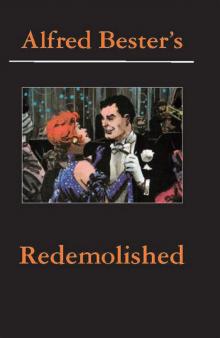 Redemolished
Redemolished The Flowered Thundermug
The Flowered Thundermug The Starcomber
The Starcomber Virtual Unrealities: The Short Fiction of Alfred Bester
Virtual Unrealities: The Short Fiction of Alfred Bester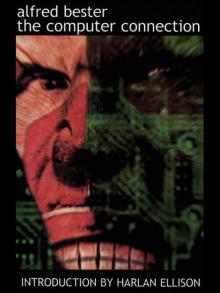 The Computer Connection
The Computer Connection Selected Stories of Alfred Bester
Selected Stories of Alfred Bester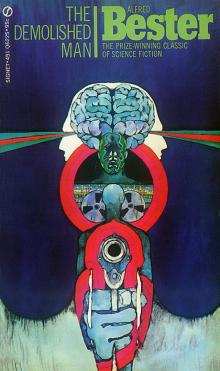 The Demolished Man
The Demolished Man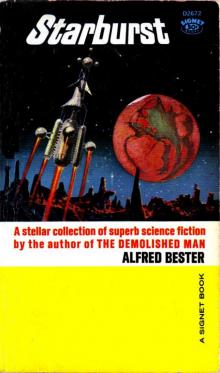 Starburst
Starburst Psychoshop
Psychoshop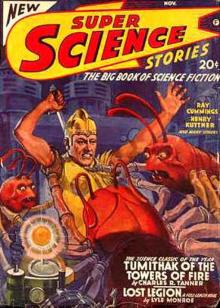 Biped Reegan
Biped Reegan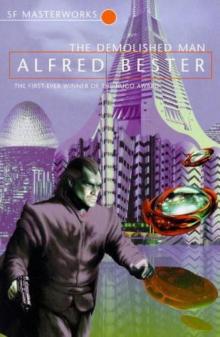 Demolished Man
Demolished Man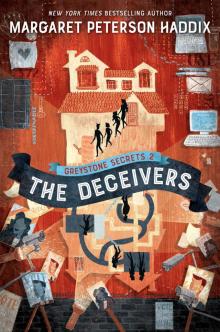 THE DECEIVERS
THE DECEIVERS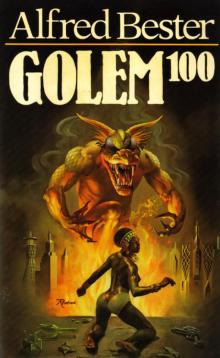 GOLEM 100
GOLEM 100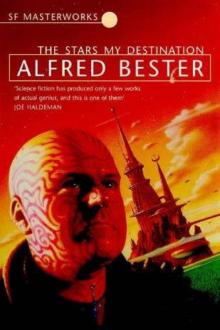 The Stars My Destination
The Stars My Destination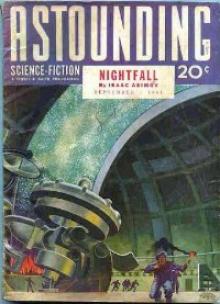 Adam And No Eve
Adam And No Eve The Stars My Destination ( Tiger! Tiger! )
The Stars My Destination ( Tiger! Tiger! )